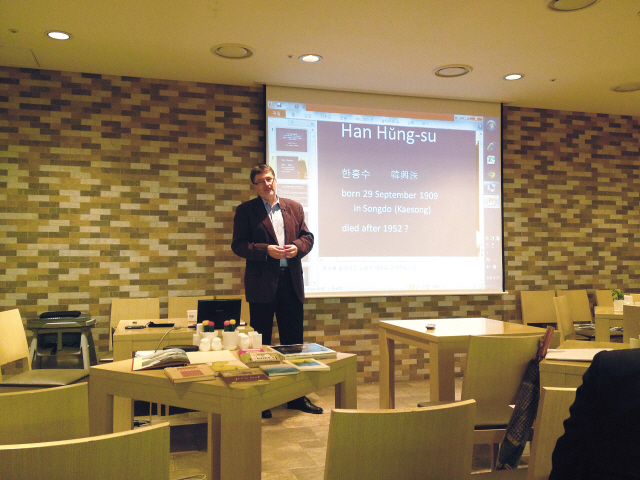One of Korea’s earliest heroes of Hallyu was not a K-pop crooner nor was he a director of violent art-house favorites.
One of the Korean Wave’s earliest acolytes was a mild-mannered 20th-century historian of Neolithic culture and, according to Czech Ambassador to Korea Jaroslav Olsa, Jr., an “unsung hero” of Korean studies in central Europe.
Scholar Han Hung-su was critical in establishing Korean studies in central Europe and made close Czech-Korean ties possible in the process, said Olsa, the Czech Republic’s top diplomat here since 2008, during a meeting of the Royal Asiatic Society Korea at a hotel in a second-floor conference room of Somerset Palace Seoul hotel on Tuesday.
 |
Czech Ambassador to Korea Jaroslav Olsa, Jr. answers questions after his lecture about Han Hung-su, founder of Korean studies at Charles University in the Czech capital city of Prague, during a meeting of the Royal Asiatic Society Korea at the Somerset Palace Seoul hotel on Tuesday. (Philip Iglauer/The Korea Herald) |
Han’s life and work had gone unnoticed since the 1950s, however, and his biography remains shrouded in many unanswered questions.
There are a few things that Olsa uncovered during his research that shed light on how awareness of Korea and Korean studies as an academic pursuit started.
After receiving his Ph.D. from the University of Fribourg in Switzerland in 1940, Han Hung-su became an accomplished scholar and advocate of Korea and Korean culture in central Europe.
Han established Korean studies at Charles University in what was then the Czechoslovakian capital city of Prague in 1950.
Han also wrote a history of Korea in German and had it published in Czech, called “Korea: Yesterday and Today,” he translated and edited hundreds of pages of Korean literature into German and Czech, and he also wrote many scholarly articles. Through all this, he was also a tireless advocate for Korean independence.
Han’s fate as an ― until now, under appreciated Korean scholar and advocate of Korean culture may have begun when lines were drawn dividing the country into communist North and capitalist South Korea. Han chose to support North Korea.
He traveled to Pyongyang soon after establishing the Korean studies program at Charles University. The decision to go to Pyongyang was not uncommon among many like-minded, left-leaning intellectuals of the time, Olsa pointed out during his lecture.
He is thought to have been killed in the 1950s during one of the political purges orchestrated by North Korea’s Kim Il-sung to eliminate possible enemies, real and imagined.
By Philip Iglauer (
ephilip2011@heraldcorp.com)








